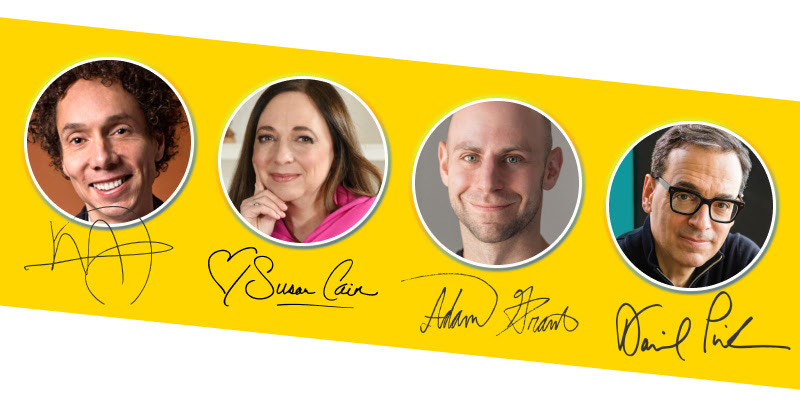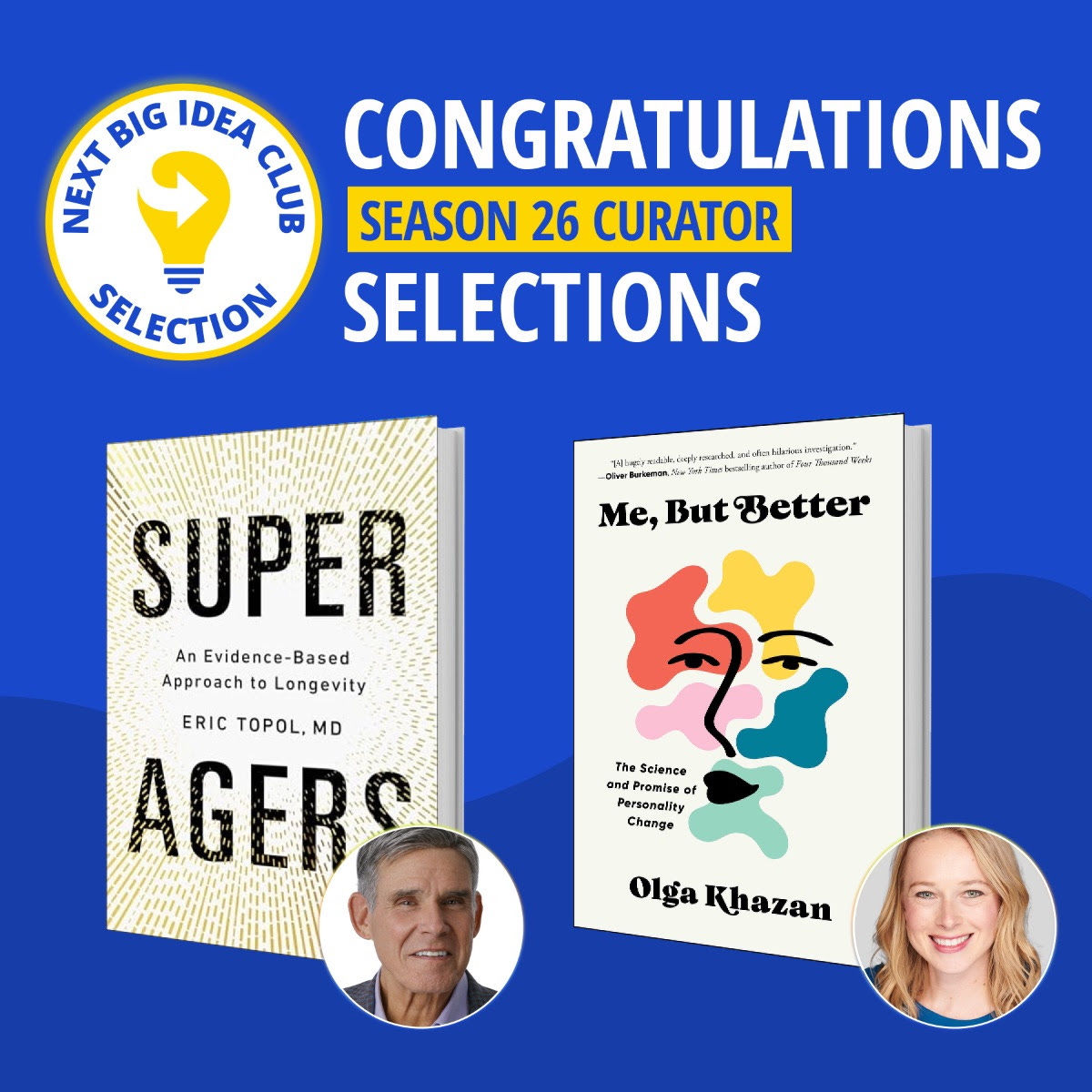ME, BUT BETTER, my book about personality change, is out now. If you haven’t yet, please pick up your copy today. And if you’ve read the book, it would mean the world to me if you could leave an Amazon review. Thank you!

First, I’m thrilled to share that Me, But Better, has been selected as a Next Big Idea Club winner for Season 26!
The club was co-founded by Malcolm Gladwell, Susan Cain, Adam Grant, and Daniel Pink to spotlight the most groundbreaking nonfiction books—and this season, mine is one of them.
This means my book will be shipped to thousands of readers and featured alongside a reading guide, a "Book Bite," a Next Big Idea Podcast episode, and a live virtual Q&A with me.
You can join the Next Big Idea Club here! I can offer you 20% off any new membership with the promo code SEASON26. If you join, you will receive a copy of Me, But Better and the other selection, Eric Topol’s Super Agers: An Evidence-Based Approach to Longevity in your first box.
Now onto today’s post:
How to Boost Your Curiosity
One of the most common pieces of advice I came across when I was reporting out research-backed ways to decrease anxiety was to increase your curiosity. You’re not supposed to get curious about why you’re anxious, you’re just supposed to get ambiently … curious. The psychiatrist Jud Brewer, to name just one example, is a huge evangelist of curiosity as an antidote to anxiety. In his book, Unwinding Anxiety, he writes about how rather than trying to “think your way” out of anxiety, you should “harness the power of curiosity, tapping into it as an inner resource that drives itself (because it is rewarding.)”
Okay!
As I wrote in my book, I never really got the hang of using curiosity to unwind my anxiety. Because along with not really understanding how to do that, I had another problem: I wasn’t sure how to become more curious when I wasn’t already. Like the anxiety-busting advice to become “comfortable with uncertainty,” this is one of those things that’s hard to do if you don’t already know how to do it. And it’s especially hard to do when you’re hyperventilating with anxiety!
This paradox—that curiosity is good, but also hard to increase in people who don’t already feel curious—has bedeviled researchers for quite some time. As Madeleine Gross, a psychologist at the University of California, Santa Barbara, writes in a recent paper, curiosity is linked to an “impressive host of character virtues, including intellectual humility, creativity, resilience, gratitude, critical discernment, as well as positive outcomes, including increased academic and professional success, satisfying relationships, and increased meaning in life” but also that “not everyone has the benefit of being naturally high in curiosity.”
HOWEVER, she goes on to say, “recent psychological research indicates that individuals can develop facets of their character through behavioral interventions.” YES! This is what my book is about: How to become better at stuff you’re not “naturally” good at. Gross set out to see whether this can apply to curiosity, too.
To this end, Gross and her co-author created an iPhone app that was meant to boost their study participants’ curiosity. On some days, the app would offer the participants a researcher-assigned “daily challenge” meant to promote curiosity, like breaking your routine, writing a haiku about the present moment, or researching an idea to test whether it’s really true (like the idea that creative people are “right-brained.”) The full list of these challenges is below—and warning, a lot of them are things writers already do, or at least do as they’re procrastinating writing.
On alternating days, the participants performed curiosity-boosting behavioral goals that they had set for themselves, like “When I am on my morning commute, then I will listen to a new podcast.”
About half the app users were also instructed to perform mindful activities, like mindful walking or mindful hand-washing, during which they were supposed to get curious about whatever they were doing. They were prompted, for instance, to ask themselves questions like, “Why do certain water temperatures feel more pleasant than others?” or “How does soap work to kill bacteria?”
“We're surrounded by so many mysteries,” Gross told me. “And I feel like as kids, we're constantly asking questions to try to understand them, but [when we get older] we just kind of stop noticing all these curiosities around us. So it's kind of like tuning back into that childlike mindset and wondering how things work.”
After three weeks, Gross and her co-author found that, compared to the control group, the app users saw an increase in feelings of perceptual curiosity, meaning these participants showed a greater curiosity about their surroundings. This makes a certain amount of sense, since the app encouraged the participants to “seek novel sensory experiences, find hidden beauty in their environment, try new foods or listen to new types of music”—in other words, explore their surroundings. They were also more likely to believe that their lives were meaningful, and they felt more creative, too. The people who also did the mindfulness component saw an especially big boost in the “meaning in life” measure. In other words, this study suggests it does seem possible to change your background level of curiosity.
Now, is this the last word on this topic? Not really. The study is small—consisting of just 91 people—and a lot of the results don’t reach statistical significance, meaning the findings were pretty modest. The app didn’t totally blow the minds of those 91 people or anything.
But I still think that, when you’re caught in an anxious spiral, in writer’s block, or in a thought groove you’re not crazy about, it’s worth trying out some of these techniques. A lot of these curiosity-boosting strategies double as ways to increase the personality trait of openness to experiences, and as I write in my book, openness also seems to have beneficial effects on anxiety and neuroticism. In fact, some researchers think that the reason why psychedelics work is because they’re boosting openness, which allows the person’s brain to even accept the possibility that it’s okay to be less anxious. Openness and curiosity seem to overlap, and they both seem to turn down the volume on anxiety.
By opening us up to the world, curiosity seems to make reality less terrifying, or to at least make it more interesting. When you’re depressed as hell because you think you’ve seen it all and know it all, this study is a good reminder that probably, you haven’t and you don’t. There are still small mysteries waiting to be solved, and the prospect of that discovery is a good reason to hang in there. “By prompting individuals to seek novel experiences, explore new perspectives, and challenge existing beliefs,” Gross writes, “curiosity may act as an important catalyst for both cognitive and emotional growth.” At the very least, it’s cheaper than Lexapro.
THE FULL LIST OF CURIOSITY BOOSTERS:
Ask your friend one interesting thing they learned recently.
Discover the history behind a common phrase you use regularly.
Ask your friend one question about themselves that you are genuinely curious to know about.
Transform something ordinary in your surroundings into an object of beauty through photography.
Come up with a new, aesthetically pleasing way to arrange your food
on the plate.
Find a way, no matter how small it is, to transform your usual habits and break from your routine.
Explore a different path to a familiar destination and document your
observations.
Turn on a song and begin moving slowly until you discover a new
pose or way to position your body.
Google search “Youtube TedEd” and choose a video that intrigues
you.
Learn something fascinating on an episode of the Curiosity Weekly
podcast (search online).
Create a haiku to capture the hidden beauty or wonder in the present
moment.
Explore musical genres or artists outside your usual preferences.
Spend five minutes of your lunch break observing and capturing the
hidden world of shadows around you.
Track your emotions throughout the day to discover patterns.
Take apart a simple, everyday object
Eat a very small snack with a childlike mindset.
Start at any Wikipedia article that catches your interest, then follow
the hyperlink trail wherever your curiosity leads.
How many different species of birds can you spot today?
Explore the “why” behind an unusual animal feature.
Have a 10-minute conversation with someone where you intentionally
explore an unusual topic.
Spend five minutes deeply observing a piece of art in your
possession.
Transform three randomly generated words into a poetic haiku.
Transform a random shape drawn by someone else into a creative
work of art.
Elevate an everyday object into a museum artifact with an exhibition
description.
Excavate the origins and evolution of one of your core beliefs.
Research something you’ve always assumed is true to test its validity.
Write with your non-dominant hand.
When you use a household item, a technology, or a word, ask
yourself how it works or what its history is, then try to learn more about it.
Discover how other people see you through their choice of three
descriptive words.
Create a visual representation of your core values
Find a new recipe for food you already have in your fridge.
Discover a small creature in its environment and imagine the world
from its perspective.
Choose a specific color and document every instance of it you
encounter throughout your day.
Create an authentic audio meditation to foster openness and curiosity.
Take some time to look into one of your friend’s beliefs or their side to
an argument.
Embody the experience of someone in a current news story through
imagination and photography.
Reach out to someone you know and ask them to teach you
something or tell you something they learned recently.
Create an unpredictable story one sentence at a time with a partner.
Interview someone from a different generation to explore how life
experiences have changed over time.
Rediscover forgotten stories by exploring old photographs with
someone who shares your history.
Engage in a structured curiosity-based 20-minute debate with
someone on a topic where you may hold different perspectives.
Conduct an in-depth interview with someone who has experience of
war from any perspective.
Create a digital gallery showcasing the art that has been part of your
home environment.
Research and explore the work and philosophy of a contemporary
artist previously unknown to you.
Create a visual representation of someone you’ve only heard about
through descriptions.
Craft a creative backstory inspired only by a book’s title and its final
page.






Dear Olga, I enjoyed your very important article about the Fair Play methode. This writer, Zawn Villenes on Substack, describes why the method somoften doesnt work.
Congrats on the Next Big Idea Club selection!